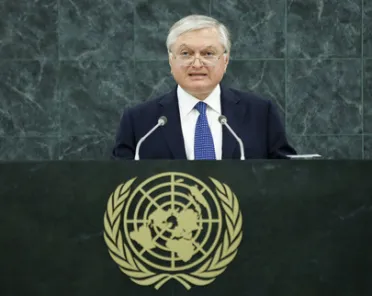Statement
Statement summary
Edward Nalbandyan, Minister of Foreign Affairs of Armenia, said that the international community should to analyse its commitments with a view of the challenges that had arisen while implementing the Millennium Development Goals. The world financial crisis had significantly distracted States from the charted path, but it had also shown that no country could achieve the Goals in isolation. Peace seemed to remain elusive in many parts of the world, and his country was alarmed by the worsening humanitarian situation in Syria, whose citizens continued to flee to his country, already numbering more than 10,000. Plus, tens of thousands of Syrian-Armenians were still in Syria, after that country had become their second home following the genocide of 1915. They were struggling for survival. Armenia welcomed Security Council adoption of resolution 2118 (2013), and hoped it would lead to an end to the suffering of its people. More broadly, he said his country believed that there was “no alternative to peaceful solutions of conflicts”, which required political will and determination. On 18 June, the co-Chairs of the Minsk Group of the Organization for Security and Cooperation in Europe (OSCE) — France, Russian Federation and the United States — had made a statement on the Nagorno-Karabakh conflict. Armenia shared their position and agreed that “peoples should be prepared for peace not war”. Unfortunately, the Azerbaijani leadership was doing just the opposite, including through anti-Armenian speeches, thus seriously endangering the region’s security. Despite its participation in the Security Council, Azerbaijan was also disregarding Council resolutions relevant to the conflict. Armenia, however, would continue its efforts to seek a peaceful solution. In March, the Human Rights Council had adopted by consensus a resolution on the prevention of genocide, initiated by Armenia and co-sponsored by more than 60 countries, he recalled. The recognition, condemnation and prevention of genocide were a priority for his country, as it was a nation that had survived the first genocide of the twentieth century. Armenia also unequivocally welcomed the clear position adopted by United Nations Member States in precluding any possibility of immunity or pardon for perpetrators of crimes against humanity. In May, Armenia had assumed the Chairmanship of the Council of Europe. The cooperation between that Council and the United Nations was well-established in the fight against racism, xenophobia and intolerance, which was another high priority of his country’s agenda. Armenia supported United Nations reform as an opportunity to enhance the role of the Organization, he concluded.
Full statement
Read the full statement, in PDF format.
Photo

Previous sessions
Access the statements from previous sessions.
